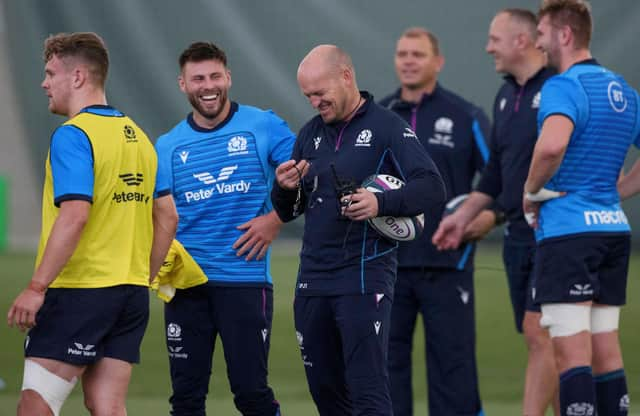Gregor Townsend is right - we should believe, Scotland's narrative is changing


Such a response would have been reasonable. After all, we have never beaten New Zealand, and, though we have drawn with the All Blacks twice, these brave days are somewhat distant: 1964 and 1983. We have occasionally beaten South Africa and Australia, but lost far more often, and this alas is the case, not least in the professional era, with England, France, Ireland and Wales.
We have only once reached the semi-final of the World Cup, and that was also some time ago – 1991 when all our pool matches, quarter-final and indeed that semi-final we lost to England were played at Murrayfield. To cap it all, we didn’t reach the knock-out stage of the last RWC in Japan.
Advertisement
Hide AdAdvertisement
Hide AdYet I would guess that Gregor Townsend’s words are at most likely to have been met with a sceptical raised eyebrow rather than an incredulous laugh. They may even seem quite reasonable to many. In once sense they obviously are. A team that can go to Twickenham and Stade de France and win, as Scotland did in the Spring, has plenty of self-belief – justified self-belief, even if one qualifies these achievements by the reminder that the Covid-enforced absence of vociferous home crowds may have made these excursions to foreign fields just a little less daunting. Conversely the very narrow lost matches to Wales and Ireland might have gone the other way if Murrayfield had been full, as it will be for three of the games over the next weeks.
The first against Tonga next week may not tell us much, both teams being at little more than half-strength. The games against South Africa, Australia and Japan are rather different. I would say that two of them must be won if this new-founded self-belief isn’t going to be dented. We won’t be quite at full-strength, both the first-choice locks, Jonny Gray and Scott Cummings being posted missing, injured. I’m a little surprised that Jonny’s big brother Richie hasn’t been called up. He has all played more successive games this season than for quite some time, and, even if no longer perhaps as fast and formidable a ball-carrier as he was in his prime, his line-out expertise would surely be more than useful.
Still, even without the Grays and Cummings, the pack should be pretty good. The back division, whoever Townsend picks, will be more experimental, with Stuart Hogg, Sean Maitland, Chris Harris, Duhan van der Merwe, Finn Russell, Adam Hastings and Huw Jones all being retained by their clubs. Ali Price, Sam Johnson and Darcy Graham will however be available, though depending on how things have gone for the Lions scrum-half against Leinster, he may well be held back for the harder assignments to follow.
Scotland’s improvement over the last 18 months was marked by having the biggest contingent in the Lions squad in the professional era. This is one reason for thinking that Townsend ‘s confidence is justified. Another, and very important one, is that he can name a match-day squad that is rich in experience, but without players who, on account of their age, are approaching the Departure Lounge. None is a battered veteran like Alun Wyn Jones or Johnny Sexton. Players can age quickly, losing their spark almost overnight, but I don’t see anyone in this autumn’s squad who looks in immediate danger of that happening to him.
Some, like the captain Stuart Hogg have been at the top for a long time now. He was first capped in 2012, but won’t be 30 till next June. Yet his enthusiasm seems undiminished. His fellow Lion Chris Harris is older, but, a late developer, has many fewer miles on the clock. His best days may still be before him, and this is true of other Lions -Price, Van der Merwe, Rory Sutherland, Zander Fagerson, Hamish Watson; possibly, and remarkable, Russell too. Moreover, there are young, still uncapped-players biting at the heels of established stars: Glasgow’s Rory Darge and Rufus McLean, for example.
So, yes, the future looks brighter than at any time since the game went professional. Still optimism should be restrained. All sort of things can go wrong, with individuals and with a team. Nevertheless it’s exciting to be on the brink of an international season, confident that the glass is a good deal more than half-full, even three-quarters full, rather that, as it often has been, half-empty and sinking further.